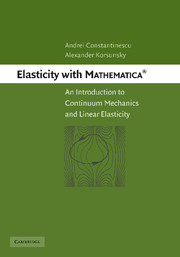Book contents
- Frontmatter
- Contents
- Acknowledgments
- Introduction
- 1 Kinematics: displacements and strains
- 2 Dynamics and statics: stresses and equilibrium
- 3 Linear elasticity
- 4 General principles in problems of elasticity
- 5 Stress functions
- 6 Displacement potentials
- 7 Energy principles and variational formulations
- Appendix 1 Differential operators
- Appendix 2 MATHEMATICA® tricks
- Appendix 3 Plotting parametric meshes
- Bibliography
- Index
6 - Displacement potentials
Published online by Cambridge University Press: 11 November 2009
- Frontmatter
- Contents
- Acknowledgments
- Introduction
- 1 Kinematics: displacements and strains
- 2 Dynamics and statics: stresses and equilibrium
- 3 Linear elasticity
- 4 General principles in problems of elasticity
- 5 Stress functions
- 6 Displacement potentials
- 7 Energy principles and variational formulations
- Appendix 1 Differential operators
- Appendix 2 MATHEMATICA® tricks
- Appendix 3 Plotting parametric meshes
- Bibliography
- Index
Summary
OUTLINE
In this chapter we consider the application of the methods of displacement potential and demonstrate the implementation of these methods in Mathematica.
The fundamental expression for the Papkovich–Neuber representation of the elastic displacement fields is introduced first. Papkovich representations of the simple strain states are next considered, followed by the fundamental singular solutions for the centres of dilatation and rotation and the Kelvin solution for the concentrated force in an infinite solid. From the Kelvin solution the momentless force doublet and the force doublet with moment are derived by differentiation. The combination of three mutually perpendicular momentless force doublets is considered and is shown to be equivalent to the centre of dilatation. This example is used to demonstrate the nonuniqueness of the Papkovich description of elastic solutions. The combination of the centre of dilatation with a force doublet is also shown to correspond to a point eigenstrain solution. The point shear eigenstrain is compared with the combination of two force doublets.
Boussinesq and Cerruti solutions for the concentrated force applied at the boundary of a semi-infinite elastic solid are presented next. Solutions for concentrated forces applied at the vertex of an infinite cone are derived using the same principles from superpositions of known solutions for concentrated forces and lines of centres of rotation and dilatation.
Information
- Type
- Chapter
- Information
- Elasticity with Mathematica ®An Introduction to Continuum Mechanics and Linear Elasticity, pp. 157 - 188Publisher: Cambridge University PressPrint publication year: 2007
